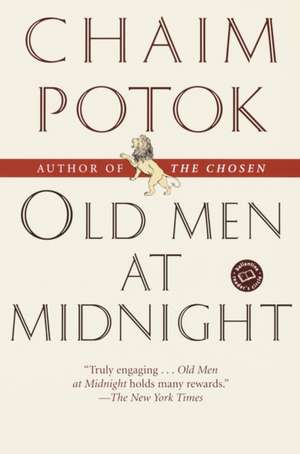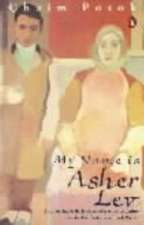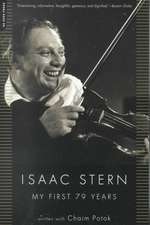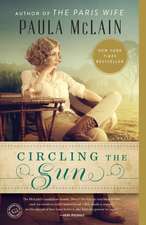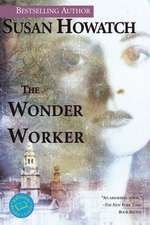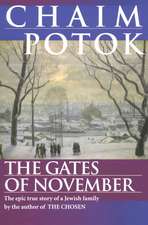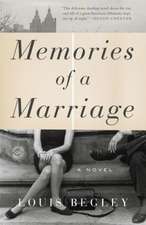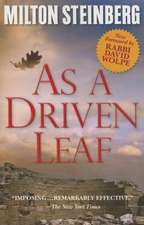Old Men at Midnight
Autor Chaim Potoken Limba Engleză Paperback – 30 iun 2002
Ilana Davita Dinn is the listener to whom three men relate their lives.
As a young girl, she offers English lessons to a teenage survivor of the camps. In “The Ark Builder,” he shares with her the story of his friendship with a proud old builder of synagogue arks, and what happened when the German army invaded their Polish town.
As a graduate student, she finds herself escorting a guest lecturer from the Soviet Union, and in “The War Doctor,” her sympathy moves him to put his painful past to paper recounting his experiences as a Soviet NKVD agent who was saved by an idealistic doctor during the Russian civil war, only to encounter him again during the terrifying period of the Kremlin doctors’ plot.
And, finally, we meet her in “The Trope Teacher,” in which a distinguished professor of military history, trying to write his memoirs, is distracted by his wife’s illness and by the arrival next door of a new neighbor, the famous writer I. D. (Ilana Davita) Chandal.
Poignant and profound, Chaim Potok’s newest fiction is a major addition to his remarkable—and remarkably loved—body of work.
From the Hardcover edition.
Preț: 106.48 lei
Nou
Puncte Express: 160
Preț estimativ în valută:
20.39€ • 21.01$ • 17.11£
20.39€ • 21.01$ • 17.11£
Carte disponibilă
Livrare economică 01-15 februarie
Preluare comenzi: 021 569.72.76
Specificații
ISBN-13: 9780345439987
ISBN-10: 0345439988
Pagini: 304
Dimensiuni: 142 x 208 x 17 mm
Greutate: 0.25 kg
Ediția:Revised
Editura: BALLANTINE BOOKS
Locul publicării:United States
ISBN-10: 0345439988
Pagini: 304
Dimensiuni: 142 x 208 x 17 mm
Greutate: 0.25 kg
Ediția:Revised
Editura: BALLANTINE BOOKS
Locul publicării:United States
Notă biografică
Chaim Potok, trained as a rabbi and an editor, became an international success with his beloved first novel, The Chosen, and over the following thirty-odd years he gave us many other memorable works, both fiction and nonfiction. He died on July 23, 2002.
From the Hardcover edition.
From the Hardcover edition.
Extras
1
Noah was brought to our brooklyn neighborhood by his aunt and uncle, and into my life by an announcement on the bulletin board of our synagogue: sixteen-year-old boy from europe needs english tutor.
This was early in the summer of 1947, two years after the end of the Second World War. No name, just a telephone number.
I called that night. A woman answered.
"Hello, who is it?" She sounded fretful, harried. "Who is calling, please?"
I said in Yiddish, "A good week."
There was a slight pause. "Ah, a good week," she said. Her tone softened.
I said in English, "My name is Davita Dinn. I'm calling about your request for an English tutor."
In the background I heard children crying. Turning away from the phone, she shouted something in Yiddish, which I did not understand. Into the phone she said, "You have done this before, teach English?"
"Yes. But not to a European survivor."
"How old are you?"
"Nearly eighteen."
"Where do you live?"
I told her.
"We will come to you. Is it all right tomorrow at three?"
I was alone when they arrived. Answering the front door bell, I saw a stocky, plain-looking woman in her thirties, garbed in a dark-gray dress that reached to below her knees. The dress had a frilly high neck and long sleeves. Standing a little behind and to her right was a thin boy in his teens, wearing a white long-sleeved shirt, dark trousers, and a dark skullcap.
I said, "Hello."
The woman said, "I am Sarah Polit."
"Come in."
We went into the living room. The afternoon sun fell on the pale-blue carpeting and the brick fireplace and the large painting of flowers on the wall.
The woman and the boy sat on the sofa. I took the easy chair across from them. The woman turned to the boy and spoke to him in Yiddish.
The boy had been staring at the fireplace. Now he looked at me, cleared his throat, and said something in Yiddish in a shaky voice.
I said, "I'm sorry, I don't understand Yiddish."
Sarah Polit said with surprise, "You speak no Yiddish?"
"My parents raised me in English."
"Your parents are in America a long time?"
"My mother came in early 1920. My father's family has been here since the seventeenth century."
"The seventeenth century?"
"Yes."
"What does your father do?"
"My father is dead."
"Ah, I am sorry."
The boy sat looking at the two of us. He had oval features: pallid skin across his cheekbones, a straight nose, a pointed chin. His hair was cut short and black, and his wide dark eyes darted from me to his aunt. I did not know how much of the conversation he understood.
Sarah Polit asked, "What did you say your name is?"
"Ilana Davita Dinn."
"Dinn is your father's name?"
"No, my stepfather's."
"What does your stepfather do?"
"He's an immigration lawyer."
She looked at my blond hair and blue eyes. "You observe the commandments?"
Her questions did not surprise me; she wanted to be sure about the kind of home to which she was entrusting the boy.
I told her that I observed the commandments.
"And you have taught English to people who have come from Europe?"
"Yes."
She was quiet.
I turned to the boy. "What's your name?"
The boy looked at his aunt.
"Tell her, Noah."
"I am call Noah Stremin."
"Where did you hear English?"
"American soldati after war."
Sarah Polit was looking closely at my blond hair and blue eyes. She asked, "What was your father? What did he do?"
"He was a journalist."
"What was his name?"
"Michael Chandal."
"You took your stepfather's name?"
"He gave me his name when he adopted me."
Sarah Polit sat back. I had the notion she had decided to ask no more questions. We were a religious family, and she was fortunate to have found us. Most teachers didn't want to work during the summer months; many took their families to bungalows in the country to get them away from the streets.
I asked, "Where in Europe are you from, Mrs. Polit?"
"I came in the twenties from a town called Kralov, not far from Cracow."
"I know about Cracow. About sixty thousand Jews."
"Well, Kralov had four thousand Jews, a Jewish market, small synagogues and schools, and a wooden synagogue. Both our families were from Kralov."
He was sitting next to her, looking at the carpet. His face without expression. It was not possible to tell if he understood what she was saying.
"There was a pogrom in Kralov in the late twenties, and my father sent me here to America. He, my mother, and my two brothers, they stayed. May their memories be for a blessing."
The boy raised his hands, turned them over, and looked at them. A grimace crossed his face. Putting his hands back on his knees, he sat staring at the fireplace.
Pronouncing the words with care, I asked him, "Noah, is there anything special you like to do?"
He raised his head and looked at me blankly.
"I thought we might start with words for something you enjoy doing."
Sarah Polit said, "He was three years in a slave labor camp and two years in a displaced persons camp. He just now arrived in America. He does not yet know what he likes."
"Can he come twice a week?"
"Twice a week. Yes."
"Sundays and Wednesdays."
"What do you charge?"
"Five dollars a lesson. We can start this Wednesday at three."
"What should he bring?"
"A notebook and a pencil."
"That's all?"
"For the time being."
"I thank you."
She spoke to the boy in Yiddish. He got off the sofa, and I saw him go through the entrance hallway to the front door. As he opened the door he gave me an over-the-shoulder look, and I felt his dark eyes on my face. He closed the door behind him.
Sarah Polit remained seated on the sofa, looking at the door. Then she turned to me.
"Noah is the only one who survived."
"The only one in his family? I am sorry."
"The only Jew in the town."
I felt cold to the bone.
"Four thousand Jews, and he is the only survivor. My husband and I, we say to ourselves God saved him for a reason."
I sat very still.
She rose from the sofa. "He knows, of course. He has terrible dreams." She looked around the room. "Tell me, is three o'clock the only time you have?"
"It's best for me."
She smoothed her dress. "He will be here on Wednesday, God willing. I thank you very much for your time."
She went out the door.
From the window of the living room I watched them walk along the street together in the hot shade of the early summer maple trees.
From the Hardcover edition.
Noah was brought to our brooklyn neighborhood by his aunt and uncle, and into my life by an announcement on the bulletin board of our synagogue: sixteen-year-old boy from europe needs english tutor.
This was early in the summer of 1947, two years after the end of the Second World War. No name, just a telephone number.
I called that night. A woman answered.
"Hello, who is it?" She sounded fretful, harried. "Who is calling, please?"
I said in Yiddish, "A good week."
There was a slight pause. "Ah, a good week," she said. Her tone softened.
I said in English, "My name is Davita Dinn. I'm calling about your request for an English tutor."
In the background I heard children crying. Turning away from the phone, she shouted something in Yiddish, which I did not understand. Into the phone she said, "You have done this before, teach English?"
"Yes. But not to a European survivor."
"How old are you?"
"Nearly eighteen."
"Where do you live?"
I told her.
"We will come to you. Is it all right tomorrow at three?"
I was alone when they arrived. Answering the front door bell, I saw a stocky, plain-looking woman in her thirties, garbed in a dark-gray dress that reached to below her knees. The dress had a frilly high neck and long sleeves. Standing a little behind and to her right was a thin boy in his teens, wearing a white long-sleeved shirt, dark trousers, and a dark skullcap.
I said, "Hello."
The woman said, "I am Sarah Polit."
"Come in."
We went into the living room. The afternoon sun fell on the pale-blue carpeting and the brick fireplace and the large painting of flowers on the wall.
The woman and the boy sat on the sofa. I took the easy chair across from them. The woman turned to the boy and spoke to him in Yiddish.
The boy had been staring at the fireplace. Now he looked at me, cleared his throat, and said something in Yiddish in a shaky voice.
I said, "I'm sorry, I don't understand Yiddish."
Sarah Polit said with surprise, "You speak no Yiddish?"
"My parents raised me in English."
"Your parents are in America a long time?"
"My mother came in early 1920. My father's family has been here since the seventeenth century."
"The seventeenth century?"
"Yes."
"What does your father do?"
"My father is dead."
"Ah, I am sorry."
The boy sat looking at the two of us. He had oval features: pallid skin across his cheekbones, a straight nose, a pointed chin. His hair was cut short and black, and his wide dark eyes darted from me to his aunt. I did not know how much of the conversation he understood.
Sarah Polit asked, "What did you say your name is?"
"Ilana Davita Dinn."
"Dinn is your father's name?"
"No, my stepfather's."
"What does your stepfather do?"
"He's an immigration lawyer."
She looked at my blond hair and blue eyes. "You observe the commandments?"
Her questions did not surprise me; she wanted to be sure about the kind of home to which she was entrusting the boy.
I told her that I observed the commandments.
"And you have taught English to people who have come from Europe?"
"Yes."
She was quiet.
I turned to the boy. "What's your name?"
The boy looked at his aunt.
"Tell her, Noah."
"I am call Noah Stremin."
"Where did you hear English?"
"American soldati after war."
Sarah Polit was looking closely at my blond hair and blue eyes. She asked, "What was your father? What did he do?"
"He was a journalist."
"What was his name?"
"Michael Chandal."
"You took your stepfather's name?"
"He gave me his name when he adopted me."
Sarah Polit sat back. I had the notion she had decided to ask no more questions. We were a religious family, and she was fortunate to have found us. Most teachers didn't want to work during the summer months; many took their families to bungalows in the country to get them away from the streets.
I asked, "Where in Europe are you from, Mrs. Polit?"
"I came in the twenties from a town called Kralov, not far from Cracow."
"I know about Cracow. About sixty thousand Jews."
"Well, Kralov had four thousand Jews, a Jewish market, small synagogues and schools, and a wooden synagogue. Both our families were from Kralov."
He was sitting next to her, looking at the carpet. His face without expression. It was not possible to tell if he understood what she was saying.
"There was a pogrom in Kralov in the late twenties, and my father sent me here to America. He, my mother, and my two brothers, they stayed. May their memories be for a blessing."
The boy raised his hands, turned them over, and looked at them. A grimace crossed his face. Putting his hands back on his knees, he sat staring at the fireplace.
Pronouncing the words with care, I asked him, "Noah, is there anything special you like to do?"
He raised his head and looked at me blankly.
"I thought we might start with words for something you enjoy doing."
Sarah Polit said, "He was three years in a slave labor camp and two years in a displaced persons camp. He just now arrived in America. He does not yet know what he likes."
"Can he come twice a week?"
"Twice a week. Yes."
"Sundays and Wednesdays."
"What do you charge?"
"Five dollars a lesson. We can start this Wednesday at three."
"What should he bring?"
"A notebook and a pencil."
"That's all?"
"For the time being."
"I thank you."
She spoke to the boy in Yiddish. He got off the sofa, and I saw him go through the entrance hallway to the front door. As he opened the door he gave me an over-the-shoulder look, and I felt his dark eyes on my face. He closed the door behind him.
Sarah Polit remained seated on the sofa, looking at the door. Then she turned to me.
"Noah is the only one who survived."
"The only one in his family? I am sorry."
"The only Jew in the town."
I felt cold to the bone.
"Four thousand Jews, and he is the only survivor. My husband and I, we say to ourselves God saved him for a reason."
I sat very still.
She rose from the sofa. "He knows, of course. He has terrible dreams." She looked around the room. "Tell me, is three o'clock the only time you have?"
"It's best for me."
She smoothed her dress. "He will be here on Wednesday, God willing. I thank you very much for your time."
She went out the door.
From the window of the living room I watched them walk along the street together in the hot shade of the early summer maple trees.
From the Hardcover edition.
Descriere
From the celebrated author of "The Chosen" and "My Name Is Asher Lev, " a trilogy of related novellas about a woman whose life touches three very different men--stories that encompass some of the profoundest themes of the 20th century. Accelerated Reader: Reading Level 5.9, 11 Points.
